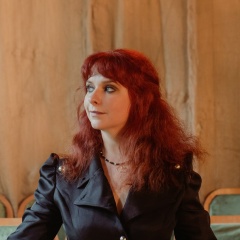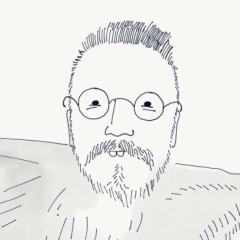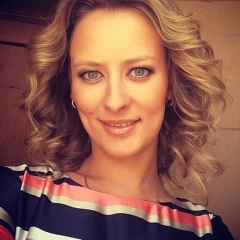Департамент культуры города Москвы, Московский центр музейного развития, совместно с Музеем Москвы, Музеем истории ГУЛАГа и Государственным музеем обороны Москвы запускают проект "Помним"
Семейное прошлое хранится на страницах домашних фотоальбомов, на пожелтевших листках писем и в старинных документах. А что, если сложное прошлое нашей страны разметало членов семьи по российским просторам так, что даже имен ваших предков до вас никто не донес? Как с помощью редких найденных артефактов - ветхих писем, да клочка старой повестки восстановить свою семейную историю? Мероприятия проекта расскажут о технологиях работы, сбора и сохранения как материальных объектов памяти, так и нематериальных её источников. Ведь история каждой семьи - это маленькая крупица в мозаике истории нашей страны.
Мероприятия проекта:
16 декабря 2016 года
18:00
Лекция «Предмет и память – нематериальное в материальном. Зачем хранить, изучать и восстанавливать предметы?»
Лекторий Музея Москвы
Зубовский б-р, 2
Лектор: Татьяна Викторовна Гафар
начальник службы развития малых музеев Государственной Третьяковской галереи
Участие бесплатное, необходимо предварительно зарегистрироваться по ссылке:
https://muzey-moskvy.timepad.ru/event/417536/
Слушатели узнают о мемориальных функциях предметов, познакомятся с понятиями консервация и реставрация, приемами, помогающими сохранять вещи в домашних условиях. Фильм «Реставрация памяти» представит мнение реставраторов о своей профессии и о том, как можно восстанавливать не только предметы, но и эмоции.
-------------------------------------------
17 декабря 2016 года, 12:00
Лекция «Семейный архив: как его собрать, организовать и передать в музей»
Лекторий Музея Москвы
Зубовский б-р, 2
Лектор: Любовь Петровна Брюшкова
кандидат исторических наук и старший научный сотрудник Московского государственного института культуры (МГИК)
Участие бесплатное, необходимо предварительно зарегистрироваться по ссылке:
https://muzey-moskvy.timepad.ru/event/417549/
Где можно получить документы по истории раскулачивания семей и копии документов по расстрельным делам? Как отыскать воинов, пропавших в период Великой Отечественной войны и финской кампании? Как найти детей, попавших в детские дома? Ответы на эти и другие вопросы все желающие смогут узнать, прослушав лекцию «Семейный архив: как его собрать, организовать и передать в музей». Доклад содержит многочисленные источники информации по истории семьи, а также предложен новый способ построения родословного дерева. В завершении доклада изложены правила организации архивных документов и передачи семейного архива в музей.
-------------------------------------------
20 декабря 2016 года, 19:30
Мастер-класс "Семейная история"
Кинозал-лекторий Государственного музея истории ГУЛАГа
1-й Самотечный пер., 9 стр. 1
Руководитель мастер-класса: Константин Алексеевич Андреев
руководитель Образовательного центра Государственного музея истории ГУЛАГа
Участие бесплатное, необходимо предварительно зарегистрироваться по ссылке:
https://gulagmuseum.timepad.ru/event/413269/
История отдельно взятой семьи – очень важная составляющая истории страны и мира. Ее важно знать, изучать, сохранять и передавать следующим поколениям. В рамках мастер-класса его участники узнают, как делать это наиболее эффективно. В современном обществе все ярче становится интерес к своим корням, появляется больше возможностей по изучению исторических источников, на новый уровень выходит изучение домашних архивов. Участники мастер-класса узнают об особенностях сохранения документов в домашнем архиве, способах его изучения и передачи информации о предках детям. Ведущий мастер-класса расскажет, как семейная история может воспитывать и прививать ценности
-------------------------------------------
25 декабря 2016 года, 15:00
[Театрализованная экскурсия в Музее обороны Москвы]
Музей обороны Москвы
ул. Олимпийская деревня, 3
Участие бесплатное
Проводит экскурсию Кирилл Александрович Дряннов
Театрализованная экскурсия в Музее обороны Москвы познакомит всех желающих с событиями, происходившими в Москве во время Второй Мировой Войны. С помощью аудио-визуальных приёмов посетителям во время экскурсии предстоит совершить путешествие во времени и погружение в быт Москвы 1941-1945 года.
Семейное прошлое хранится на страницах домашних фотоальбомов, на пожелтевших листках писем и в старинных документах. А что, если сложное прошлое нашей страны разметало членов семьи по российским просторам так, что даже имен ваших предков до вас никто не донес? Как с помощью редких найденных артефактов - ветхих писем, да клочка старой повестки восстановить свою семейную историю? Мероприятия проекта расскажут о технологиях работы, сбора и сохранения как материальных объектов памяти, так и нематериальных её источников. Ведь история каждой семьи - это маленькая крупица в мозаике истории нашей страны.
Мероприятия проекта:
16 декабря 2016 года
18:00
Лекция «Предмет и память – нематериальное в материальном. Зачем хранить, изучать и восстанавливать предметы?»
Лекторий Музея Москвы
Зубовский б-р, 2
Лектор: Татьяна Викторовна Гафар
начальник службы развития малых музеев Государственной Третьяковской галереи
Участие бесплатное, необходимо предварительно зарегистрироваться по ссылке:
https://muzey-moskvy.timepad.ru/event/417536/
Слушатели узнают о мемориальных функциях предметов, познакомятся с понятиями консервация и реставрация, приемами, помогающими сохранять вещи в домашних условиях. Фильм «Реставрация памяти» представит мнение реставраторов о своей профессии и о том, как можно восстанавливать не только предметы, но и эмоции.
-------------------------------------------
17 декабря 2016 года, 12:00
Лекция «Семейный архив: как его собрать, организовать и передать в музей»
Лекторий Музея Москвы
Зубовский б-р, 2
Лектор: Любовь Петровна Брюшкова
кандидат исторических наук и старший научный сотрудник Московского государственного института культуры (МГИК)
Участие бесплатное, необходимо предварительно зарегистрироваться по ссылке:
https://muzey-moskvy.timepad.ru/event/417549/
Где можно получить документы по истории раскулачивания семей и копии документов по расстрельным делам? Как отыскать воинов, пропавших в период Великой Отечественной войны и финской кампании? Как найти детей, попавших в детские дома? Ответы на эти и другие вопросы все желающие смогут узнать, прослушав лекцию «Семейный архив: как его собрать, организовать и передать в музей». Доклад содержит многочисленные источники информации по истории семьи, а также предложен новый способ построения родословного дерева. В завершении доклада изложены правила организации архивных документов и передачи семейного архива в музей.
-------------------------------------------
20 декабря 2016 года, 19:30
Мастер-класс "Семейная история"
Кинозал-лекторий Государственного музея истории ГУЛАГа
1-й Самотечный пер., 9 стр. 1
Руководитель мастер-класса: Константин Алексеевич Андреев
руководитель Образовательного центра Государственного музея истории ГУЛАГа
Участие бесплатное, необходимо предварительно зарегистрироваться по ссылке:
https://gulagmuseum.timepad.ru/event/413269/
История отдельно взятой семьи – очень важная составляющая истории страны и мира. Ее важно знать, изучать, сохранять и передавать следующим поколениям. В рамках мастер-класса его участники узнают, как делать это наиболее эффективно. В современном обществе все ярче становится интерес к своим корням, появляется больше возможностей по изучению исторических источников, на новый уровень выходит изучение домашних архивов. Участники мастер-класса узнают об особенностях сохранения документов в домашнем архиве, способах его изучения и передачи информации о предках детям. Ведущий мастер-класса расскажет, как семейная история может воспитывать и прививать ценности
-------------------------------------------
25 декабря 2016 года, 15:00
[Театрализованная экскурсия в Музее обороны Москвы]
Музей обороны Москвы
ул. Олимпийская деревня, 3
Участие бесплатное
Проводит экскурсию Кирилл Александрович Дряннов
Театрализованная экскурсия в Музее обороны Москвы познакомит всех желающих с событиями, происходившими в Москве во время Второй Мировой Войны. С помощью аудио-визуальных приёмов посетителям во время экскурсии предстоит совершить путешествие во времени и погружение в быт Москвы 1941-1945 года.
The Moscow Department of Culture, the Moscow Center for Museum Development, together with the Moscow Museum, the GULAG History Museum and the Moscow State Defense Museum are launching the “Remember” project
Family past is stored on the pages of home photo albums, on yellowed sheets of letters and in old documents. And what if the complicated past of our country swept family members across Russian expanses so that even no names of your ancestors came before you? How can rare old artifacts be found - old letters, but a piece of an old agenda to restore your family history? Project activities will tell about the technologies of work, collection and preservation of both material objects of memory and its intangible sources. After all, the history of each family is a small bit in the mosaic of the history of our country.
Project activities:
December 16, 2016
18:00
Lecture "Subject and memory - intangible in the material. Why keep, study and recover items? ”
Lecture Hall of the Museum of Moscow
Zubovsky blvd, 2
Lecturer: Tatiana V. Gafar
Head of the development of small museums of the State Tretyakov Gallery
Participation is free, you must first register at the link:
https://muzey-moskvy.timepad.ru/event/417536/
Students will learn about the memorial functions of objects, get acquainted with the concepts of conservation and restoration, techniques that help keep things in the home. The film “Restoration of Memory” will present the opinion of restorers about their profession and how to restore not only objects, but also emotions.
-------------------------------------------
December 17, 2016, 12:00
Lecture "Family Archives: How to Collect, Organize and Transfer to the Museum"
Lecture Hall of the Museum of Moscow
Zubovsky blvd, 2
Lecturer: Lyubov Petrovna Bryushkova
Candidate of Historical Sciences and Senior Researcher of the Moscow State Institute of Culture (IPCC)
Participation is free, you must first register at the link:
https://muzey-moskvy.timepad.ru/event/417549/
Where can I get documents on the history of dispossession of families and copies of documents on firing cases? How to find warriors who disappeared during the Great Patriotic War and the Finnish campaign? How to find children in orphanages? Everyone will be able to find out the answers to these and other questions after listening to the lecture “Family Archives: How to Collect, Organize and Transfer It to the Museum”. The report contains numerous sources of information on family history, as well as a new method for constructing a family tree. At the end of the report, the rules for organizing archival documents and the transfer of the family archive to the museum are set forth.
-------------------------------------------
December 20, 2016, 7:30 pm
Master Class "Family History"
Cinema-lecture hall of the State Museum of History of the Gulag
1st Samotechny Lane., 9 p. 1
Master class leader: Konstantin Alekseevich Andreev
Head of the Educational Center of the State Museum of History of the Gulag
Participation is free, you must first register at the link:
https://gulagmuseum.timepad.ru/event/413269/
The history of a single family is a very important component of the history of the country and the world. It is important to know, learn, preserve and pass on to next generations. During the master class, participants will learn how to do this most effectively. In modern society, interest in its roots is becoming ever more vivid, there are more opportunities to study historical sources, the study of home archives goes to a new level. Participants in the master class will learn about the features of storing documents in the home archive, how to study it, and transmit information about ancestors to children. The master of the master class will tell how family history can nurture and instill values
-------------------------------------------
December 25, 2016, 15:00
[Theatrical tour in the Museum of the Defense of Moscow]
Moscow Museum of Defense
st. Olympic Village 3
Participation is free
Leads a tour Kirill Aleksandrovich Dryannov
The dramatized excursion at the Museum of Defense of Moscow will acquaint everyone with the events that took place in Moscow during the Second World War. With the help of audio-visual techniques, visitors during the tour will have to make a trip in time and dive into the life of Moscow in 1941-1945.
Family past is stored on the pages of home photo albums, on yellowed sheets of letters and in old documents. And what if the complicated past of our country swept family members across Russian expanses so that even no names of your ancestors came before you? How can rare old artifacts be found - old letters, but a piece of an old agenda to restore your family history? Project activities will tell about the technologies of work, collection and preservation of both material objects of memory and its intangible sources. After all, the history of each family is a small bit in the mosaic of the history of our country.
Project activities:
December 16, 2016
18:00
Lecture "Subject and memory - intangible in the material. Why keep, study and recover items? ”
Lecture Hall of the Museum of Moscow
Zubovsky blvd, 2
Lecturer: Tatiana V. Gafar
Head of the development of small museums of the State Tretyakov Gallery
Participation is free, you must first register at the link:
https://muzey-moskvy.timepad.ru/event/417536/
Students will learn about the memorial functions of objects, get acquainted with the concepts of conservation and restoration, techniques that help keep things in the home. The film “Restoration of Memory” will present the opinion of restorers about their profession and how to restore not only objects, but also emotions.
-------------------------------------------
December 17, 2016, 12:00
Lecture "Family Archives: How to Collect, Organize and Transfer to the Museum"
Lecture Hall of the Museum of Moscow
Zubovsky blvd, 2
Lecturer: Lyubov Petrovna Bryushkova
Candidate of Historical Sciences and Senior Researcher of the Moscow State Institute of Culture (IPCC)
Participation is free, you must first register at the link:
https://muzey-moskvy.timepad.ru/event/417549/
Where can I get documents on the history of dispossession of families and copies of documents on firing cases? How to find warriors who disappeared during the Great Patriotic War and the Finnish campaign? How to find children in orphanages? Everyone will be able to find out the answers to these and other questions after listening to the lecture “Family Archives: How to Collect, Organize and Transfer It to the Museum”. The report contains numerous sources of information on family history, as well as a new method for constructing a family tree. At the end of the report, the rules for organizing archival documents and the transfer of the family archive to the museum are set forth.
-------------------------------------------
December 20, 2016, 7:30 pm
Master Class "Family History"
Cinema-lecture hall of the State Museum of History of the Gulag
1st Samotechny Lane., 9 p. 1
Master class leader: Konstantin Alekseevich Andreev
Head of the Educational Center of the State Museum of History of the Gulag
Participation is free, you must first register at the link:
https://gulagmuseum.timepad.ru/event/413269/
The history of a single family is a very important component of the history of the country and the world. It is important to know, learn, preserve and pass on to next generations. During the master class, participants will learn how to do this most effectively. In modern society, interest in its roots is becoming ever more vivid, there are more opportunities to study historical sources, the study of home archives goes to a new level. Participants in the master class will learn about the features of storing documents in the home archive, how to study it, and transmit information about ancestors to children. The master of the master class will tell how family history can nurture and instill values
-------------------------------------------
December 25, 2016, 15:00
[Theatrical tour in the Museum of the Defense of Moscow]
Moscow Museum of Defense
st. Olympic Village 3
Participation is free
Leads a tour Kirill Aleksandrovich Dryannov
The dramatized excursion at the Museum of Defense of Moscow will acquaint everyone with the events that took place in Moscow during the Second World War. With the help of audio-visual techniques, visitors during the tour will have to make a trip in time and dive into the life of Moscow in 1941-1945.
У записи 6 лайков,
0 репостов.
0 репостов.
Эту запись оставил(а) на своей стене Константин Андреев


























